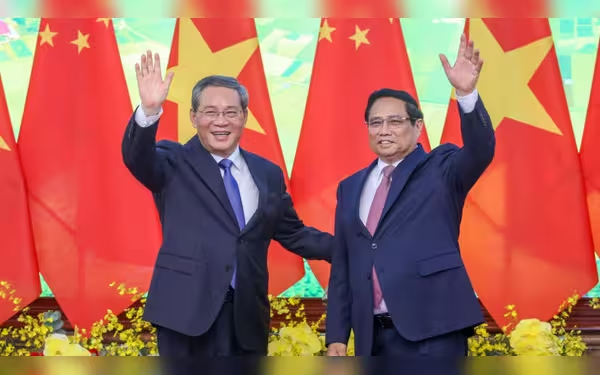Saturday, November 16, 2024 09:57 PM
Vietnam China Rail Links and Cross-Border Payments Expansion
- Vietnam and China sign ten agreements to enhance ties.
- New rail link to facilitate trade and travel.
- Cross-border payment services using QR codes introduced.
 Image Credits: channelnewsasia
Image Credits: channelnewsasiaVietnam and China enhance ties with new rail links and cross-border payment agreements, promoting trade and economic cooperation.
Vietnam and China have taken significant steps towards enhancing their economic and transportation ties by signing ten agreements on October 13. This development comes after a meeting between Vietnamese Prime Minister Pham Minh Chinh and Chinese Premier Li Qiang, highlighting the importance both nations place on strengthening their relationship.
Among the key agreements is a plan to expand cross-border railway links. This includes a technical plan for a new rail connection between Lao Cai in northern Vietnam and Hekou in China's Yunnan province. Such a link is expected to facilitate smoother trade and travel between the two countries, making it easier for goods and people to move across the border.
In addition to the railway agreement, both countries have signed a memorandum of understanding (MoU) to implement cross-border payment services using QR codes. This modern payment method will simplify transactions for businesses and individuals, promoting economic cooperation. Furthermore, an agreement was reached to study a model for an "economic cooperation zone" along their shared border, which could lead to increased investment and development in the region.
China is Vietnam's largest trading partner, but the relationship is not without its challenges. Historical tensions, particularly regarding the South China Sea, continue to loom over their interactions. This vital waterway is crucial for global trade, with trillions of dollars worth of goods passing through it each year. Despite these tensions, both nations are committed to enhancing their defense and economic cooperation, as reported by Vietnamese state media.
During discussions, Vietnam's top leader, To Lam, and Premier Li Qiang agreed to maintain regular high-level exchanges in defense, security, and foreign affairs. This commitment to ongoing dialogue is essential for building trust and addressing any potential conflicts that may arise.
Moreover, Vietnam has expressed its willingness to facilitate more high-tech investments from China, while China has promised to improve market access for Vietnamese agricultural products. This mutual agreement is a positive step towards fostering a balanced and beneficial trade relationship.
The recent agreements between Vietnam and China mark a pivotal moment in their bilateral relations. By focusing on infrastructure, payment systems, and economic cooperation, both countries are laying the groundwork for a more integrated future. As they navigate their historical tensions, the commitment to collaboration could lead to a more prosperous and stable region, benefiting not only Vietnam and China but also their trading partners around the world.













